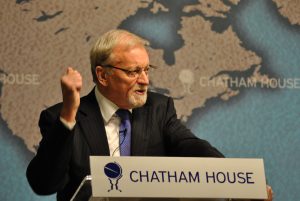Earlier this week, the former Australian Foreign Minister Gareth Evans wrote a short article in which he claimed that the crisis in Myanmar meets the threshold for the invoking of the Responsibility to Protect (R2P) doctrine.
Since the military’s seizure of power on February 1, the country has been engulfed in protest as hundreds of thousands have taken to the streets in protest. In the ensuing crackdown, at least 261 mostly unarmed protesters have been confirmed killed by the security forces (and probably many more) while several thousand have been detained for anti-coup activities.
“The present crisis in Myanmar demands unequivocally to be treated as an R2P one – as were the early periods of one-sided repression of peaceful dissent in Libya and Syria,” Evans wrote.
The point has been made by others, but carries additional weight given the role that Evans played, as co-chair of the International Commission on Intervention and State Sovereignty, in the establishment of R2P as an internationally recognized norm.
Endorsed by all member states of the United Nations in 2005, R2P advances a potentially revolutionary idea: that state sovereignty entails a responsibility for a government to protect its population from mass atrocity crimes and human rights violations. When a nation fails to exercise this responsibility, R2P grants the “international community” the legal warrant to intervene. The doctrine authorizes the use of a range of coercive tools, with military intervention as a last resort.
In his article, Evans called for more concerted action by the five permanent members of the U.N. Security Council, which earlier this month passed a presidential statement calling for the military and its auxiliaries to exercise “utmost restraint” and “stress[ing] the need to uphold democratic institutions and processes, refrain from violence, fully respect human rights and fundamental freedoms and uphold the rule of law.”
R2P’s applicability to Myanmar has raised directly by many of those protesting the military junta, who have held up placards calling for international intervention to restore democratic rule under the aegis of R2P. Evans acknowledged that military intervention under R2P was a non-starter, for a variety of practical and political reasons, but said that the rest of the “R2P toolbox” should be employed to bring the crisis to an end, “including not only more naming and shaming, but U.N.-endorsed targeted sanctions, embargoes, and threats of [International Criminal Court] prosecution.”
Yet Evans also recognized the limitations of outside powers to bring about a resolution to the complex, combustive crisis that has followed the Myanmar coup. He rightly pointed out that “internal dynamics rather than any kind of external pressure” would ultimately carry the day, adding, “The hope must be that the military will either split apart, or come to recognize that the country has simply become ungovernable and will become even more so until they step back.”
To this end, there was an important role for a U.N.-led international response, to “give the opposition forces continued heart, and make the Tatmadaw understand their friendlessness in the wider world even if they, for now, think they can stare that down.”
Yet Evans also stated that, while threatening ICC prosecutions and other punishments, the nations of the world should also begin contemplating an option that currently “nobody on either side is willing to even begin to contemplate – i.e. some kind of military-face-saving compromise… whereby things return to something like the status quo ante.”
“That is not the revolution that the population want, need and deserve,” Evans acknowledged. “But if the military refuses to divide and crumble enough for that to happen, it would beat the hell out of another catastrophic 1988-scale massacre.”
On that count he is certainly correct. But if this is the desired endgame, it remains to be seen whether sanctions and threats of ICC persecution are more or less likely to bring Sen. Gen. Min Aung Hlaing and his fellow generals to the table. For now, the jury is out. But just as the invocation of R2P by Myanmar’s protesters testifies to the doctrine’s growing international prestige, Evans’s invocation of “hope” is an indication of just how far we remain from a lasting solution to the challenge posed by governments that abuse their own people.

































